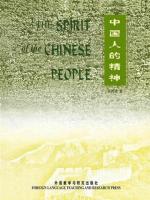Review
The Spirit of the Chinese People , written by the esteemed scholar Ku Hung-ming, is a comprehensive exploration of the profound cultural roots and spiritual essence that have shaped the Chinese people. It offers us the insight of the unique identity and character of Chinese civilization.
At the main part of this book lies Ku Hung-ming's profound understanding and appreciation of Chinese culture. He believes that the character of the Chinese and the characteristics of Chinese civilization are the perfect combination of depth, broadness, simplicity and sensitivity. This spiritual characteristic not only enables the Chinese to adhere to their culture and beliefs in the face of foreign aggression, but also enables Chinese civilization to be inherited and developed in the long history, which is a great thing to do since at that period the idea of western sprite is much more advanced than the traditional Chinese sprite dominated the civil mind. The author mainly expounds his point of view by comparing and explaining the different manifestations of the same thing in China and abroad so as to express the special and complex characteristic contained by Chinese sprite and suggest us suppose to have an uniqueness and superiority in our spiritual world.
The book delves into the rich history and traditions of China, tracing the development of its civilization from ancient times to the present. The author highlights the importance of Confucianism, Taoism, and other philosophical traditions that have shaped the Chinese worldview and social structure. And he explained all his ideas in a very simple and straightforward way.
The explanation he gave of what is a real Chinaman is quite impressive to me, by using a long sentence with parallelism, he said that “a real Chinaman may be coarse, but there is no grossness in his coarseness,may be ugly, but there is no hideousness in his ugliness, may be vulgar, but there is no aggressiveness, no blatancy in his vulgarity, may be stupid, but there is no absurdity in his stupidity, may be cunning, but there is no deep malignity in his cunning”, which is a very good expression of what is “ZhongYong”, although some people may prefer to translate is into “the golden mean”.
There is one phenomenon caused by Chinese sprite he had mentioned are very intriguing to me. “in China war is an accident, whereas in Europe war has become a necessity”.
About the first phenomena the author had made some explanation from three aspects: differences in cultural concepts, the role of moral force, and attitudes towards war. Harmony, stability, and moral power are emphasized in Chinese culture, and Confucianism, as a system of Chinese philosophy and moral norms, teaches people to maintain social order through self-cultivation and moral restraint. In this cultural context, war is seen as a breach of harmony and stability, so the Chinese tend to avoid war as an accident. In European culture, war is seen as a means of settling disputes and pursuing power due to long-term historical and religious conflicts, so war is inevitable in European culture. At this point, we have to mention why religion is not as prevalent in China as it is in the West. The main reason is that Chinese generally believe in the inherent goodness of human nature and will educate their children in this way from an early age. This idea will prompt people to spontaneously abide by and maintain the stable order of society, and thus reduce the occurrence of war.
However, while we are talking about the review of a book, there must be some drawbacks. Due to the limitation caused by the times, many of the ideas in his book will seem backward and inappropriate now. For example, his understanding of Western culture in the book may have been limited by access to information at the time, leading to misunderstandings or prejudices against certain aspects of Western society. For example, he may not fully understand the complexity and diversity of Western society, and simply reduce it to a certain pattern or characteristic. Also, author seems have a very clear rejection of modernity. There are many expressions in the book that reflect this concept, arguing that the process of modernization has undermined China's traditional culture and social order. However, modernization is an inevitable historical trend and is of great significance for China's development and progress. Most importantly, his neglect of western science and technology. He believes that the Chinese live a spiritual life and have no interest in abstract, rigid science and technology, the idea of “immorality” is what we should try to achieve. This view may seem too supercilious in modern times, because science and technology play a vital role in modern society.
In conclusion, although limited by the background of the times, this book will have some views that seem out of place now, but this book still provides a very specific explanation of our traditional culture in a more understandable expression, which can help us understand the spiritual core of the Chinese and the national character of the Chinese. It’s still worth-reading.



 京公网安备 11010802032529号
京公网安备 11010802032529号